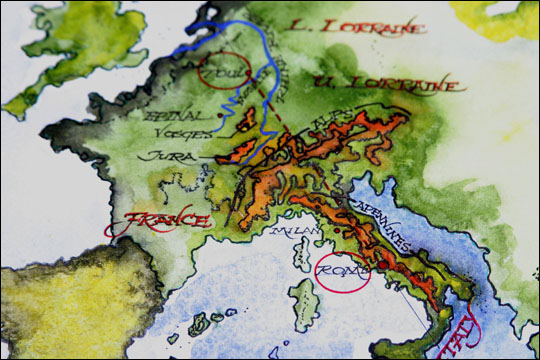I read this on
Fr. Z's blog and thought it was absolutely hilarious. This was
submitted by a seminarian reader to him. I did not write this but I wish I did!
The Seminarian’s Song
To the Tune of the Major-General’s Song from The Pirates of Penzance
I am the very model of Catholic seminarian
I’ve information pastoral, canonical, and Marian,
I know the Popes of Avignon and Councils Ecumenical
From Nicaea to Vatican plus gatherings heretical.
I’m very well acquainted too with matters homiletical,
I’ll write a pretty sermon that is eloquent yet practical,
About soteriology I’m teeming with a lot o’ news…
Such as salvation history’s relation to the modern Jews.
I’m very open minded, I have Sunday lunch with Protestants,
I teach them our Church History and sing it in Gregorian Chants,
In short in matters pastoral, canonical, and Marian,
I am the very model of a Catholic seminarian.
I know my ancient languages, some Latin, Greek, and Hebrew too;
I’m smart as a Dominican, I write for
The Thomist review,
I quote Thomas Aquinas and I know the Summa all by heart,
I know the arguments for God from Anselm to Rene Descartes;
I am an expert without doubt in all matters liturgical,
I’ll see the rubrics carried out in fashion demiurgical!
I can intone polyphony from every epoch, school and rank…
And sing all of the arias composed by Mister Cesare Franck.
Then I can run a bingo or a bake sale in the Parish Hall,
And sell spaghetti supper tickets at the local shopping mall:
In short, in matters pastoral, canonical, and Marian,
I am the very model of a Catholic seminarian.
In fact, when I know what is meant by “Molinist” and “Arian,”
When I can rise above the title of Popish sectarian,
When such affairs as wakes and confirmations I’m more wary at,
And when each sort of imperfection, sin, and fault I can combat;
When I have learnt the progress of von Balthasar’s theology,
Converted every member of the Church of Scientology—
In short, when I’ve a smattering of basic Catholicity—
They’ll say that I’m a cleric full of goodness and simplicity.
And though my Bishop is impressed by my enormous panurgy,
The man is rather wary at my love for Latin Liturgy,
But still in matters pastoral, canonical, and Marian,
I am the very model a Catholic seminarian.
 Courtesy is small and simple, like the mustard seed in our Gospel today. The typical mustard seed is about a quarter of an inch round, but it can grow to become a huge tree, about 15 feet tall in a matter of weeks! Jesus uses this image to describe what the kingdom of God is like. The kingdom of God is where people experience something heavenly, something divine. All it takes are simple good deeds like courtesy to help someone around us begin to experience the kingdom of God in all its breadth.
Courtesy is small and simple, like the mustard seed in our Gospel today. The typical mustard seed is about a quarter of an inch round, but it can grow to become a huge tree, about 15 feet tall in a matter of weeks! Jesus uses this image to describe what the kingdom of God is like. The kingdom of God is where people experience something heavenly, something divine. All it takes are simple good deeds like courtesy to help someone around us begin to experience the kingdom of God in all its breadth.
